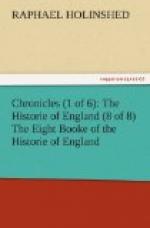Vos quoq; qui fortes animas belloq; peremptas,
Laudius in longum vares dimittitis aeuum,
Plurima securi fudistis carmina Bardi:
[Sidenote: II. F.]
And you o poet Bards from danger
void that dities sound,
Of soules of dreadlesse men, whom rage
of battell would confound,
And make their lasting praise to time
of later age rebound.
Because the names of these poets were neither discrepant from the ciuilitie of the Romans, nor repugnant to the religion of the Christians, they (of all the other sects before specified) were suffered onlie to continue vnabolished in all ages, insomuch that there flourished of them among the Britains (according to Bale) before the birth of Christ, [Sidenote: Iohn Bale script. Britan. cent. 2. John Prise defen hist. Brit. Caius de ant. Cant. lib. 1. Iohn Leland syllab. ant dict. Hum. Lloyd de Mona insula] Plenidius and Oronius: after Christ (as Prise recounteth) Thalestine, and the two Merlins, Melkin, Elaskirion, and others: and of late daies among the Welshmen, Dauid Die, Ioslo Gough, Dauid ap William, with an infinite number more. And in Wales there are sundrie of them (as Caius reporteth) remaining vnto this day, where they are in their language called (as Leland writeth) Barthes. Also by the witnes of Humfrey Llhoyd, there is an Iland neere vnto Wales, called Insula Bardorum, and Bardsey, whereof the one name in Latine, and the other in Saxon or old English, signifieth the Iland of the Bardes or Barthes.
Thus farre the gouernement of the Celts in this Ile.




